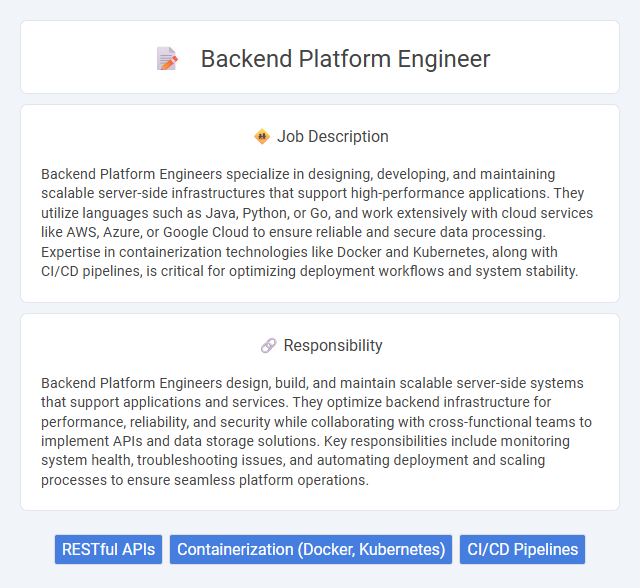
Backend Platform Engineers specialize in designing, developing, and maintaining scalable server-side infrastructures that support high-performance applications. They utilize languages such as Java, Python, or Go, and work extensively with cloud services like AWS, Azure, or Google Cloud to ensure reliable and secure data processing. Expertise in containerization technologies like Docker and Kubernetes, along with CI/CD pipelines, is critical for optimizing deployment workflows and system stability.
Individuals with strong problem-solving skills and a passion for building scalable systems will likely thrive as Backend Platform Engineers. Those comfortable working in fast-paced environments and collaborating with cross-functional teams may find this role suits their strengths. Candidates who prefer predictable tasks over complex system design might not be as well-suited for this position.
Qualification
Backend Platform Engineer roles require strong proficiency in programming languages such as Java, Python, or Go, alongside extensive experience with cloud platforms like AWS, Azure, or Google Cloud. Candidates must demonstrate expertise in designing scalable backend systems, microservices architecture, and container orchestration tools such as Kubernetes and Docker. Proficiency in database management, API development, and CI/CD pipeline automation is essential for optimizing platform performance and reliability.
Responsibility
Backend Platform Engineers design, build, and maintain scalable server-side systems that support applications and services. They optimize backend infrastructure for performance, reliability, and security while collaborating with cross-functional teams to implement APIs and data storage solutions. Key responsibilities include monitoring system health, troubleshooting issues, and automating deployment and scaling processes to ensure seamless platform operations.
Benefit
A Backend Platform Engineer role likely offers significant benefits such as opportunities to enhance system scalability and reliability, which can improve career growth in high-demand technical skills. Access to advanced technologies and collaborative environments may increase job satisfaction and innovation. Competitive compensation and potential for remote work could also contribute to an attractive work-life balance.
Challenge
Backend Platform Engineer roles likely involve tackling complex scalability challenges to ensure robust and efficient system performance. The probability of encountering intricate problem-solving scenarios related to infrastructure automation and service orchestration is high. Continuous adaptation to evolving technologies and debugging sophisticated backend integrations may frequently test one's technical expertise and innovation skills.
Career Advancement
Backend Platform Engineers specializing in scalable architecture and cloud infrastructure experience rapid career advancement due to high demand for their expertise in microservices and container orchestration. Proficiency in programming languages like Python, Java, or Go, combined with skills in Kubernetes and AWS, significantly enhances promotion prospects and leadership opportunities. Mastery in CI/CD pipelines and system reliability engineering accelerates progression toward senior engineering and platform architect roles.
Key Terms
RESTful APIs
Backend Platform Engineers specialize in designing and maintaining scalable RESTful APIs that enable seamless communication between client applications and backend services. They optimize API performance, implement secure authentication protocols such as OAuth, and ensure reliable data exchange through well-structured endpoints and robust error handling. Expertise in frameworks like Node.js, Django, or Spring Boot is essential for developing scalable platform architecture.
Containerization (Docker, Kubernetes)
Backend Platform Engineers specialize in designing and maintaining scalable containerized environments using Docker and Kubernetes to streamline application deployment and orchestration. They optimize infrastructure for efficient resource utilization, ensuring high availability and seamless scaling of microservices across development, staging, and production. Expertise in container orchestration, cluster management, and CI/CD integration is essential to enhance platform reliability and developer productivity.
CI/CD Pipelines
Backend Platform Engineers design and maintain robust CI/CD pipelines to streamline software delivery and ensure continuous integration and deployment efficiency. They leverage tools like Jenkins, GitLab CI, or CircleCI to automate testing, building, and deployment processes, enabling faster release cycles and improved code quality. Expertise in containerization technologies such as Docker and orchestration platforms like Kubernetes enhances pipeline scalability and reliability across development environments.
 kuljobs.com
kuljobs.com